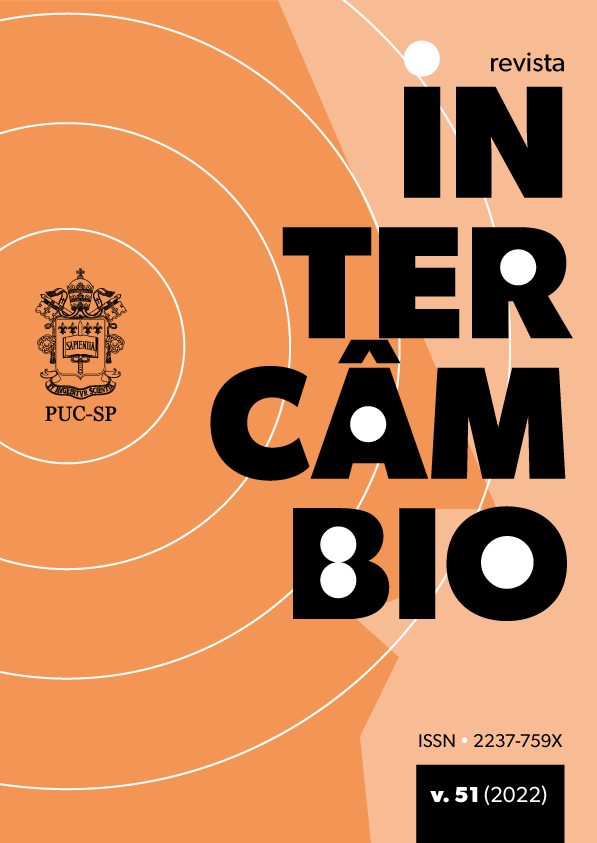Missa do Galo de Machado de Assis e a Avaliatividade Implícita
um enfoque da Linguística Sistêmico-Funcional
Palavras-chave:
Missa do Galo, Escolhas lexicogramaticais, Linguística Sistêmico-Funcional, Linguística CríticaResumo
Missa do Galo, conto de Machado de Assis, trata do diálogo entre Nogueira, um jovem pensionista, e Conceição, a hospedeira, em uma noite de Natal em que uma simples conversa pode apresentar um jogo sublime e indireto, aparentemente banal, mas que intriga Nogueira. Este estudo apoia-se Na Linguística Sistêmico-Funcional, que oferece um instrumento analítico específico para o exame sistemático das motivações, propósitos, suposições e interesse dos produtores do texto e tem como objetivo a análise crítica das escolhas lexicogramaticais feitas no conto a fim de desvendar o que subjaz ao diálogo entre as personagens.
Referências
ABREU, A. S. A Arte de Argumentar – Gerenciando Razão e Emoção. São Paulo: Ateliê Editorial, 2008.
ASSIS, M. Missa do Galo. In: PROENÇA-FILHO, D. Melhores contos. São Paulo: Global, 2010.
BAKHTIN, M. Estética da criação verbal. São Paulo: Martins Fontes, 2003.
BEDNAREK, M. A. Frames revisited – the coherence-inducing function of frames. Journal of Pragmatics, 37.5, p. 685-706, 2005.
COFFIN, C.; O’HALLORAN, K. The role of appraisal and corpora in detecting covert evaluation. Functions of Language, 13.1, p. 77-110, 2006.
COUTINHO, A. A literatura no Brasil. São Paulo: Global, 2004.
DU BOIS, J. Taking a stance: constituting the stance differential in dialogic interaction. Annual Meeting of the American Anthropological Association, San Francisco, 2000.
DU BOIS, J. Stance and consequence: Annual Meeting of the American Anthropological Association, New Orleans, 2002.
DU BOIS, J. The intersubjectivity of interaction. The Tenth Biennial Rice University Symposium on Linguistics: “Stancetaking in Discourse: Subjectivity in Interaction”, Rice University, 2004.
FAIRCLOUGH, N. Discurso e Mudança Social. Brasília: UnB, 2001.
FLØTTUM, K. EU discourse: Polyphony and unclearness. Journal of Pragmatics, v. 42, n.4, p.990-999, 2010.
FOWLER, R. Language in the news. Nova York: Routledge, 1991.
GOATLY, A. The language of metaphors. Nova York: Routledge, 1997.
HALLIDAY, M. A. K. An introduction to Functional Grammar. Londres: Arnold, 1994.
HALLIDAY, M. A. K.; MATTHIESSEN, C. M. I. An introduction to Functional Grammar. Londres: Arnold, 2004.
HODGE, R.; KRESS. G. Social Semiotics. Nova York: Cornell Up, 1988.
KÄRKKÄINEN, E. Stance taking in conversation: From subjectivity to intersubjectivity. Text & Talk, 26.6, p. 699-731, 2006.
KITIS, E.; MILAPIDES, M. Read it and believe it: How metaphor constructs ideology in news discourse. A case study. Journal of Pragmatics, v. 28, p. 557-590, 1997.
LATOUR, B.; WOOLGAR, S. Laboratory life: the social construction of scientific facts. Califórnia: Sage, 1979.
LEMKE, J. Resources for attitudinal meaning: Evaluative orientations in text semantics. Functions of Language, 5.1, p. 33-56, 1998.
LI, J. Transitivity and Lexical Cohesion: Press Representations of a Political Disaster and its actors. Journal of Pragmatics, 42.12, p. 3444-3458, 2010.
MACKEN-HORARIK, M. Appraisal and the special instructiveness of narrative. Text, 23.2, p. 285-312 2003.
MARTIN, J. R.; MATTHIESSEN, M. I. M; PAINTER, C. Developing Functional Grammar extensively revised. Shanghai: Commercial Press, 1997.
MARTIN, J. R. Beyond exchange: Appraisal Systems in English. In: HUNSTON, S.; THOMPSON, G. (org.) Evaluation in text: authorial stance and the construction of discourse. Oxford: University Press, 2000.
MARTIN, J. R.; WHITE, P. R. R. The Language of Evaluation: Appraisal in English. Londres: Palgrave Macmillan, 2005.
MINSKY, M. A Theory of Systemic Fragility. In: ALTMAN, E. I.; SAMETZ, A. W. (org.) Financial Crises: Institutions and Markets in a Fragile Environment. Nova York: John Wiley and Sons, 1977.
MOISÉS, M. Dicionário de termos literários. São Paulo: Cultrix, 2004.
MOISÉS, M. A análise literária. São Paulo: Cultrix, 2007.
TANNEN, D. Introduction. In: TANNEN, D. (org.). Gender and conversation interaction. Nova York: Oxford University Press, 1993b.
THIBAULT, P. J. Social semiotic as praxis: Text, Social Meaning Making and Nabokov’s ‘Ada’, Minneapolis: University of Minneapolis Press, 1991.
THOMPSON, G. Resonance in text. In SANCHEZ-MACARRO, A; CARTER, R. (org.) Linguistic choice across genres: Variation in spoken and written English. Amsterdã: John Benjamins, 1998.
UNGERER, F.; SCHMID, H. An Introduction to Cognitive Linguistics. Londres: Longman, 1996.
VAN DIJK, T. A. News Analysis: Case Studies of International and National News in the Press. Nova Jersey: Lawrence Erlbaum Associates,1988.
YULE, G. The study of language. Cambridge: Cambridge University Press, 1996.
Downloads
Publicado
Como Citar
Edição
Seção
Licença
Copyright (c) 2022 Maria do Socorro Suzano Montinegro

Este trabalho está licenciado sob uma licença Creative Commons Attribution 4.0 International License.






